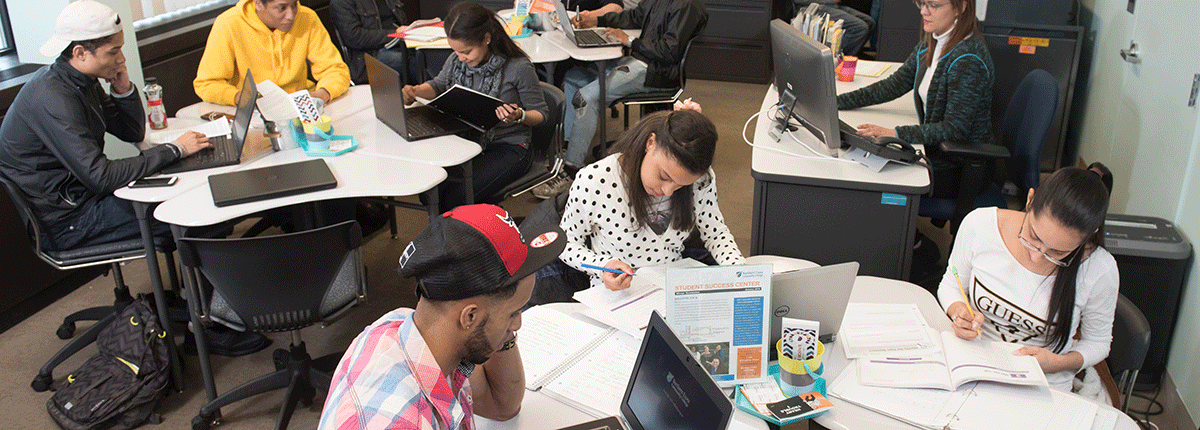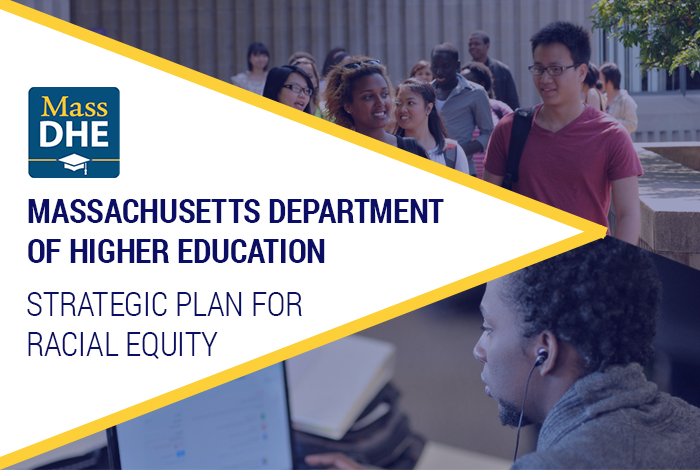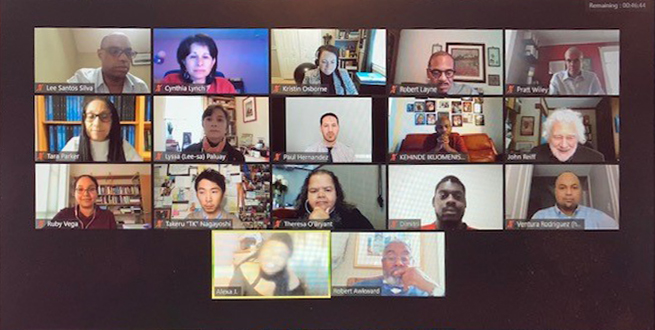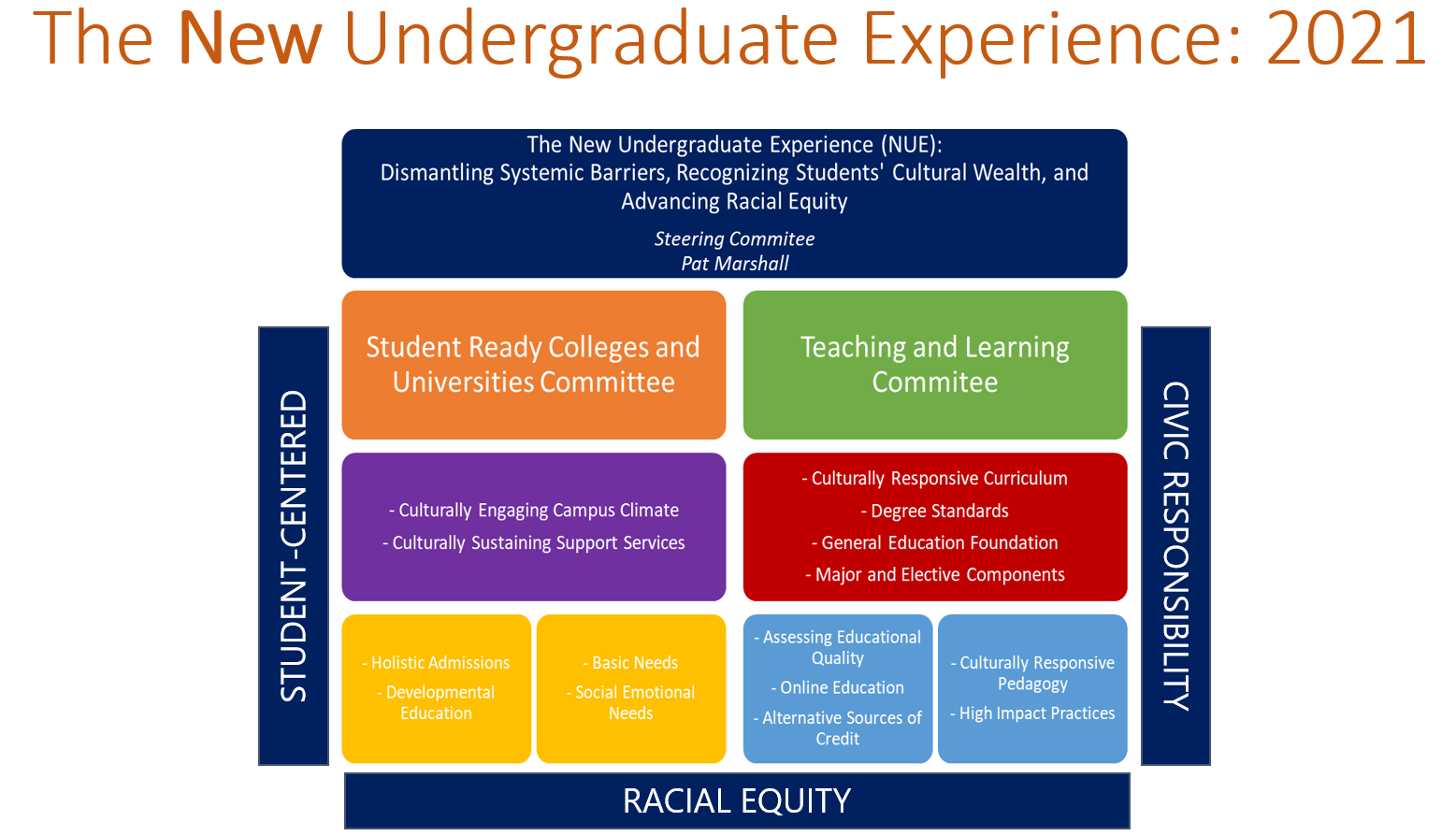
Strategic Initiatives | Equity agenda

As the Department of Higher Education (DHE) continues to advance the work of the Strategic Plan for Racial Equity (the Plan), the mission of the Plan remains the same. In partnership with key stakeholders, the goal is to transform the Commonwealth’s public higher education system to focus on racial equity as well as considerably raise the enrollment, attainment, graduation, and long-term success among Students of Color.
The Plan is focused on acknowledging the barriers that have hindered the success of Students of Color and rectifying and repairing harm. As a Commonwealth, we must critically review and evaluate our institutional policies, practices, pedagogies, and services to ensure they are rooted in racial equity. Success will be reached when racial disparities are eliminated from the public higher education system in Massachusetts.
In Fall 2022, DHE staff formed working groups to support implementation of the Plan. The purpose of these working groups is to plan and execute DHE activities associated with the Plan, stay informed on campus engagement, and identify resources for campuses.
The priorities of this work are to improve access to higher education for Students of Color, build a civically engaged educational experience for students of color, and prepare these students to thrive in their career and future beyond their time in higher education. DHE staff working on these efforts are focused on implementing recommendations to our public institutions that are based on analytical data and evidence, enhancing a student’s experience and sense of belonging while also looking at ways to expand support services that foster academic momentum and degree completion.
This work is critical to the growth and success of students attending Massachusetts institutions and cannot be successful without the support and partnership of key stakeholders.

In collaboration with over 7,000 stakeholders across the Commonwealth, the Massachusetts Department of Higher Education released the Strategic Plan for Racial Equity 2022-2033 (“The Plan”) as part of the Equity Agenda adopted by the Board of Higher Education in 2018. The Plan sets forth a roadmap for the Board of Higher Education, the Department of Higher Education, and institutions to work together to transform the Commonwealth’s public higher education to focus on racial equity and eliminate racial disparities for Students of Color across the system.
“The Massachusetts Board of Higher Education was pleased to vote to receive the plans developed by the DHE, its consultants and its process of stakeholder engagement. The Board endorses the goals and objectives and looks forward to the work ahead for the Department to work with campuses on their specific plans, to set overall quantitative goals for this work and to consider significant specific policy changes to bring forward to the Board in priority order that can spur on our overall Equity Agenda,” said BHE Chair Chris Gabrieli.
“A more complete democracy requires racial reconciliation and, by providing true educational opportunities to students historically denied them, we will be closer to that goal. Only an educated, civically engaged, and equity-minded citizenry will create a society that can live up to democracy's ideals. That is precisely what this document aspires to do,” said DHE Commissioner Carlos Santiago.
The impetus behind the Plan is clear: data show that for generations the system has failed its Students of Color. The system has produced large disparities over time in admission, enrollment, retention, and graduation rates when comparing averages for Students of Color with the averages of all students. As such, the Plan’s vision is bold: a system of student-ready, race conscious public colleges and universities that are equitable and racially just, embrace the critical assets of Students of Color, and prepare Students of Color for success. The system aims to achieve this vision by continuing to transform programs, policies, pedagogies, and practices to be rooted in racial equity and responsive to the goals and needs of Students of Color.
The Plan outlines goals pertaining to Students of Color’s journey within the public higher education system that will be achieved through the implementation of five key strategies. Each strategy includes two to three priorities and associated actions, owners, timelines, and milestones and metrics for tracking progress. The Plan will be reviewed and updated every two years based on progress against the goals and metrics to ensure relevance to the evolving needs of the system’s Students of Color.
The Commonwealth’s public higher education institutions vary in their progress to date in addressing racial equity issues; the Plan is meant to support all of them as they continue the work that they are doing to achieve racial equity. To support accountability for the implementation of the Strategic Plan for Racial Equity, the BHE and DHE will measure and track progress on all of the Plan’s goals and strategies through the Performance Measurement Reporting System and establish other accountability mechanisms so that institutions continue to make progress on the goals. Institutions are also asked to establish their own accountability mechanisms so that the entire system can work cohesively towards the elimination of racial disparities.
“The Strategic Plan for Racial Equity is an important next step in the Department of Higher Education's responsibility to racial equity and justice. Our colleges and universities have been working on addressing racial inequities to remove systemic barriers to student success for many years, and this plan outlines the needed collaboration, resources, and support to elevate our work at the institutional and state levels and fundamentally dismantle the policies, procedures, and practices that impede progress. It also shows a clear commitment from the state of Massachusetts, and our public higher education institutions that our Students of Color are a priority,” said Holyoke Community College President Christina Royal.
The Strategic Plan for Racial Equity is a product of a broad and continuous stakeholder engagement process. A Strategic Plan Steering Committee consisting of 25 members representing higher education and industry leaders guided the work through strategic planning workshops and review sessions. Additionally, the DHE hosted review sessions to garner feedback on draft versions of the Plan with the BHE and 145 Institution presidents, administrators, faculty, staff, and students. The Plan is also influenced by an “Environmental Scan” of system-wide and institution-level data, a system-wide survey of institutions stakeholders, and the New Undergraduate Experience (NUE) Report which brought together a group of more than 60 diverse higher education practitioners and leaders from across the Commonwealth to clearly express Massachusetts education leaders’ and students’ collective vision for the cultural, curricular, pedagogical, and structural changes for the public higher education transformation needed to better serve Students of Color.
“In education, there's a golden triangle of quantity, quality, and equity. You cannot ignore one while strengthening the others. We recognize that individual students are not responsible for the unequal outcomes of groups that have historically experienced discrimination and marginalization. This Plan is about applying justice and common sense to build the infrastructure, all students, but particularly students of color, need to thrive,” said Steering Committee member Jorgo Gushi.
Achieving the goals outlined in the Plan will ensure that the Commonwealth’s higher education system remains competitive and meets the demands of the economy, workforce, and Massachusetts democratic institutions. More broadly, a successful Strategic Plan for Racial Equity will ensure that Massachusetts can truly claim its title as the “education state.”
On February 1, 2022, after a 14-month collaborative authoring process, the Board of Higher Education accepted The New Undergraduate Experience: A Vision for Dismantling Barriers, Recognizing Students’ Cultural Wealth, and Achieving Racial Equity in Public Higher Education in Massachusetts (PDF), “a visioning document that is meant to lay the foundation for a 10-year statewide strategic plan focused on racial equity.” Although there are several inputs that will inform the development of DHE’s Strategic Plan for Racial Equity, the New Undergraduate Experience (NUE) is central given the number of stakeholders actively engaged and involved in its creation, the level of basic research that was undertaken to support the recommendations, and the amount and degree of vetting by key stakeholders.
Over the course of summer 2021, DHE staff received several rounds of input on the draft report from the 60+ New Undergraduate Experience Committees representing institutional faculty, staff, administration, and students; business leaders; and civic, community and national higher education leaders. This seminal document was being refined from those inputs and then shared with the Board of Higher Education (BHE) over several meetings including a Board retreat. This level of involvement by the BHE demonstrates the engagement and commitment of the Board and the continuing level of action by DHE staff.
The revised document was then shared with the presidents and chancellors of Massachusetts’ 28 public undergraduate institutions. Initially the presidents were given thirty days to review and comment on the 95-page document. However, the community college presidents asked for additional time given the importance of this document and in order to give it due consideration. Commissioner Carlos E. Santiago was happy to provide them an additional month to review the document. This was a critical step in the development of NUE since it is ultimately the campuses who are currently enacting many of these changes and will be responsible for implementing these recommendations going forward.
The presidents of all fifteen community colleges, three state universities, two University of Massachusetts campuses and the Racial Equity & Justice Institute at Bridgewater State University provided significant feedback. DHE staff reviewed and considered 166 individual elements of feedback, consulting with the institutions and incorporating much of this valuable input
Finally, the completed report was presented to the BHE on February 1. After the presentation by Dr. Patricia A. Marshall, Deputy Commissioner for Academic Affairs & Student Success, and an engaged and informed discussion by the BHE, NUE was accepted by the BHE so that it could inform the ongoing development of the Strategic Plan for Racial Equity.
Now, the work of completing the Strategic Plan for Racial Equity is moving forward and expected to be completed this summer. Earlier this year, Commissioner Santiago convened a 25-member Steering Committee to partner on the development of the Strategic Plan. The Plan is being developed through a broad and continuous collaboration with partners within and outside of higher education. To lay the foundation for the plan, the DHE conducted an “Environmental Scan” of system-wide and institution-level data. The Plan is also informed by a system-wide survey conducted to gain institution-level qualitative feedback. Further, the Strategic Planning process is aligned with another DHE signature project, the Support Services for Student Success Framework. The Department is in the process of hosting 15 review sessions with different stakeholder groups, including institutional administrators, faculty, staff, and students.

On September 21, 2021, the Racial Equity and Justice Institute, a multi-institution collaborative housed at Bridgewater State University, released a critically important work to move campus efforts toward racial equity: the Leading for Change Racial Equity and Justice Institute Practitioner Handbook
With the Equity Agenda well underway, the Department of Higher Education continues to advance key projects in pursuit of achieving racial equity in public higher education. At the June Academic Affairs Committee of the Board of Higher Education, Deputy Commissioner Patricia Marshall presented on the New Undergraduate Experience (NUE), an initiative aimed at developing a series of recommendations to reimagine our system of public higher education and our students’ undergraduate experience by recognizing their cultural wealth, transforming teaching and learning, and aligning system and institutional efforts to create student-ready colleges and universities.
The fundamental premise of the New Undergraduate Experience is that the mission of public higher education—as an engine of socio-economic mobility and critically engaged citizenship—must be realized through a commitment to advancing racial equity and justice. Central to the project of advancing racial equity is a relentless belief in the strengths, assets, and cultural wealth of all our students, as well as a recognition that our academic structures, policies, and practices have functioned as barriers to student success.
During the development of the final NUE report, several student focus groups were held which yielded several different themes and the recommendation to create a Student Bill of Rights. The themes from the student focus groups included the desire for additional support at important moments of transition, to see their identities reflected and valued in the curriculum and on campus, to be represented in student government and to have a voice in decisions that affect them, and for institutions to be transparent and accountable in implementing the Equity Agenda.
At the special Board of Higher Education (BHE) meeting on August 23, 2021, a key point of discussion will be a deeper dive of some of the preliminary NUE recommendations. The final report will be brought to the BHE in the fall, and the Student Bill of Rights will frame a series of cross-cutting equity recommendations, as well as recommendations in the various areas including Admissions & Transfer, the Curriculum, Faculty & Pedagogy, and the Co-Curriculum and Student Support. Ultimately, NUE’s recommendations focus on building the capacity of staff and faculty to recognize the assets our students bring with them and to facilitate their learning and success, and on redesigning our institutions, systems, and structures rather than remediating students.
At the beginning of Spring 2021 and in advancement of the Equity Agenda, Department of Higher Education (DHE) launched a three-year policy and program audit in which staff will recommend policy changes necessary to ensure racial equity across public postsecondary education in Massachusetts, and, more specifically, to better serve racially minoritized students attending institutions of public higher education in the Commonwealth. In describing this effort, Commissioner Carlos E. Santiago said “This audit is required that so we can thoroughly assess and examine all of our policies and initiatives, and rescind or modify those policies that create and exacerbate racial inequity, and to redesign our policy scheme to build a culturally sustainable public postsecondary system where students can thrive.”
“This audit is required that so we can thoroughly assess and examine all of our policies and initiatives, and rescind or modify those policies that create and exacerbate racial inequity, and to redesign our policy scheme to build a culturally sustainable public postsecondary system where students can thrive.”
- Commissioner Santiago
Over 20 Department staff are engaged in the Policy & Program Audit, which being co-led by Chief of Staff & Assistant Commissioner Elena Quiroz-Livanis and Assistant Commissioner Christine Williams. Policies and programs being audited this year include, but are not limited to, admissions, developmental education, dual enrollment and early college, financial aid, and the Performance Measuring Reporting System.
In support of the agency’s cultural transformation and in an effort to promote equity-minded policymaking, staff engaged in the Equity Agenda Policy and Program Audit are members of a Learning Community. The Learning Community is convened once every other month to share findings and work together to identify solutions. The standards used to inform the audit are derived from the Department’s racial equity principles.
The work of this policy and program audit will also serve to inform the broader generative work of the Department as well, allowing staff to experience a reorientation towards racial equity in concrete ways as related to the various aspects of the work of the agency.
Fundamentally, given the stark racial disparities within public postsecondary education in Massachusetts, it is imperative that we ensure those policies within the purview of the Department that already exist and that will be developed and implemented are evaluated by the DHE to ensure they are anti-racist and grounded in racial equity.

On December 9, 2020, more than fifty faculty, staff, students, and campus and community leaders from across the Commonwealth joined Commissioner Carlos E. Santiago, Deputy Commissioner of Academic Affairs & Student Success Patricia A. Marshall, and staff from the Department of Higher Education, for the virtual kick-off of The New Undergraduate Experience (NUE). Commissioner Santiago announced in his opening remarks that the New Undergraduate Experience initiative, a cornerstone of the Department of Higher Education’s Equity Action Plan, will advance racial equity by creating comprehensive recommendations to “reimagine the undergraduate experience by recognizing students’ cultural wealth, transforming teaching and learning, and aligning system and institutional efforts to create student-ready campuses.”
“The present moment’s confluence of widening racial inequities in higher education along with a paradigm-shifting pandemic has made this project an urgent priority.”
- Dr. Patricia Marshall
As Dr. Marshall explained in her remarks, The New Undergraduate Experience is an updating and re-booting of The Undergraduate Experience (UE), a comprehensive report and set of 44 recommendations published by the Massachusetts Board of Regents in 1989. Focused on achieving “excellence” in public higher education, the recommendations of the UE charted the policies and practices of public institutions for more than a generation. From the moment she arrived at the Department of Higher Education and read the 1989 report, Dr. Marshall recollected, she conceived of an ambitious re-imagining of the document. “The present moment’s confluence of widening racial inequities in higher education along with a paradigm-shifting pandemic,” Dr. Marshall said, “has made this project an urgent priority.”

The NUE will examine all aspects of the undergraduate experience through a racial equity lens, from admissions practices, to co-curricular programming and student support, to faculty development, pedagogy and curriculum. Over the next six months, the NUE’s 57 committee members will meet as three working committees to draft the report and their recommendations, drawing from proven models across the country and best practices currently being implemented in many Massachusetts public colleges and universities. Like its predecessor, The New Undergraduate Experience promises to be a visionary, aspirational, and transformative document, now with equity and justice as its core principle and guide.
Two months after the DHE announced Lumina Foundation’s $1.2 million investment in the Equity Agenda for Massachusetts public higher education, work has begun to transform programs, policies and practices to truly serve Black, Latinx, and other minoritized students in achieving their postsecondary goals.
On September 10, 2020, DHE and Lumina Foundation were joined by Senator Elizabeth Warren, Congresswoman Ayanna Pressley, and other special guests to announce a comprehensive new plan to achieve racial equity for students attending Massachusetts public colleges and universities. Catch up on the inspiring remarks...
DHE staff have completed an internal policy and program audit manual informed by the Department’s racial equity principles that will help guide the work to review all departmental policies and initiatives to ensure that they serve all students’ educational aspirations equitably and ensure that campuses are prepared to serve minoritized students.
At the same time, staff are also embarking on a project using a racial equity lens to update and reimagine the every aspect of the undergraduate experience, recognizing students’ cultural wealth, transforming teaching and learning, and aligning system and institutional efforts to create student-ready colleges and universities.
“It's gratifying to see campuses and DHE staff prioritizing the Equity Agenda even as they grapple with the public health and economic consequences of the pandemic,” said Commissioner Santiago. “As I've said many times, COVID-19 has only highlighted the inequities in our system and among our student populations, and in my mind make this work to achieve equity and racial justice all the more urgent.”
The foundational work of the Equity Agenda is drawing national notice; in October, Elena Quiroz-Livanis, Assistant Commissioner for Academic Policy & Student Success and Chief of Staff and Christine Williams, Assistant Commissioner for Regulatory Affairs and Strategic Initiatives, were invited to speak at Complete College America’s “With Equity and Justice for All” virtual conference, sharing the origins and principles of Massachusetts’ equity work with colleagues from other states.
Department of Higher Education, Six Campuses Share Grants and Set Goal to Change Programs and Policies, Improve Campus Experience and Outcomes for Black and Latinx Students
Boston, MA – September 10, 2020 – The Massachusetts Department of Higher Education has been awarded $1.2 million in grant funding by Lumina Foundation through its Talent, Innovation, Equity (TIE) initiative grant and its Equity Institution grant to dismantle systemic barriers to student success and degree attainment, particularly for Black and Latinx students. The Commonwealth is only the fifth state to receive Lumina’s Talent, Innovation, Equity (TIE) grant.
“It’s great to see the Massachusetts Department of Higher Education announce plans to take thoughtful steps toward developing and implementing policies to help eliminate racial disparities in our higher education systems.”
- Senator Elizabeth Warren
Lumina’s support through the $500,000 TIE grant and simultaneously awarded $700,000 in Equity Institution grants to six Massachusetts public community colleges and universities, as well as the Boston Foundation, will support the equity vision adopted by the Massachusetts Board of Higher Education (BHE) in December 2018. The Massachusetts Board became the first state higher education authority in the U.S. to make equity the top statewide policy and performance objective for a public system of higher education system. Last May, the Board endorsed a series of specific performance targets, including an overall college attainment goal of 70 percent for the state and a specific goal that 43 percent of African American and 32 percent of Latinx Massachusetts residents ages 25 to 64 will hold an associate degree or higher by 2024.
“The Baker-Polito Administration is focused on enhancing economic and social mobility for all Massachusetts residents and – particularly those who have been historically underserved and underrepresented on college and university campuses,” said Governor Charlie Baker. “While Massachusetts leads the nation in quality education, inequities in access and opportunity in higher education exist for students of color, and our administration is committed to continued leadership in this space through ongoing investment in equity to ensure that students receive the same resources and support to facilitate success in the classroom and beyond.”
“It’s great to see the Massachusetts Department of Higher Education announce plans to take thoughtful steps toward developing and implementing policies to help eliminate racial disparities in our higher education system," said Massachusetts Senator Elizabeth Warren, who participated in today’s grant announcement via webinar. "By developing a statewide strategic plan focused on equity, Massachusetts will better serve students of color throughout all levels of education."
“Access to quality higher education can help set students up for a lifetime of success, but systemic inequities in our higher education system prevent far too many Black and brown students from achieving their full potential,” said Massachusetts Congresswoman Ayanna Pressley, who joined Senator Warren at today’s announcement. “It’s critical that our campuses reflect the diversity of our communities, and that our colleges and universities are equipped with the resources, data, and cultural competency to support students of every background. This funding will help Massachusetts identify and address racial inequities and barriers to access and completion across our higher education landscape. We can no longer treat a higher education as a privilege and must begin to treat it as the fundamental civil right that it is.”
“In Massachusetts, while more than 57 percent of adults hold an associate degree or higher, the gaps in educational achievement and attainment and their impact on economic opportunity for many residents remain,” said Education Secretary James Peyer. “These unjust inequities have only been exacerbated by the retreat into remote learning since March, and we are grateful for the support of the Lumina Foundation as we continue to seek to close these gaps.”
“COVID-19 has exposed inequities across our state, and it has been made clear that we in higher education must look in the mirror and be willing to change the way we do business,” said Carlos E. Santiago, Massachusetts Commissioner of Higher Education. “With Lumina’s support, the Department and the Commonwealth will be able to accelerate our work to ensure that students of color from underserved communities feel welcome on campus and have the resources they need to complete their degrees and enter the workforce in a timely fashion.”
"The Massachusetts Board of Higher Education is ‘all in’ to ensure that our Commonwealth, fairly considered the leading place in the world for excellence in higher education, also leads on ensuring equity of opportunity and success for all of our own students, especially those who have historically been underserved,” said Chris Gabrieli, Chair of the Massachusetts Board of Higher Education. “We must prioritize the changes needed to achieve that."
“Lumina Foundation is thrilled to support efforts to improve outcomes for Black, Hispanic and Native American learners in Massachusetts,” said Lumina Senior Vice President and Chief Strategy Officer Danette Howard, PhD. “We have been impressed and energized by the commitment to racial equity demonstrated at all levels of the Commonwealth. We believe the work ahead will catalyze structural improvements for equity within Massachusetts institutions, communities and throughout the state.”
Lumina Foundation funding will enable the Department of Higher Education to:
In addition to the TIE Partnership Grant, six college and university campuses, as well as The Boston Foundation, are recipients of Lumina’s Equity Institution grants:
Bridgewater State University will scale its data-informed educational equity efforts to address disparities experienced by students of color through: the BSU Summer Bears bridge program which supports the retention of incoming students with lower high school GPAs through curricular and co-curricular programming; a Student Navigator who will offer care coordination and support to students identified through predictive analytics as those who would benefit from wrap-around campus student success support. The grant will also support the work of the Leading for Change Racial Equity and Justice Institute, a consortium of 25 campuses in the region committed to data-informed educational equity work, which is convened and coordinated by Bridgewater State University.
Bunker Hill Community College will build on the work of the Center for Equity and Cultural Wealth, applying its equity framework to redesign its curriculum and student academic experience in health care and STEM programs, part of an intentional strategy of culturally-responsive programming and equity minded practice.
Greenfield Community College will leverage its long-standing asset-based community development approach to diversity and inclusion as it launches a new Mountain Scholars Program, focused on recruiting students of color from regional high schools and GCC’s applicant pool. Each scholar will have a specialized advisor identified for strong cultural competency, and the program will be complemented with focused faculty professional development as well strengthened data utilization efforts.
Holyoke Community College will form and train an "equity team" of data-informed and equity-minded faculty and staff who will move the college forward in its longer-term goals and outcomes for learners of color, which are central to HCC's strategic plan. In addition, HCC will build on the success of its existing mentoring and alumni relations programs to build a mentoring network for alumni and students of color.
The Massachusetts College of Art and Design will institute a Rising Sophomore program to raise college completion rates of Black and Latinx students, arming them with software, technical skills, and other tools to give them a strong foundation in their major.
The University of Massachusetts at Boston will use Lumina support for a “RESPOND” peer coaching initiative to assist students disparately impacted by the pandemic and the shift to remote learning. A second project, Professional Apprenticeship and Career Education (PACE), will aim to reduce persistence, graduation, and career opportunity disparities through professional, on-campus paid apprenticeships, and will also include a focused equity analysis of on campus employment.
The Boston Foundation will participate in this work through Success Boston - Boston's citywide college completion initiative, which is also a Lumina Foundation Talent Hub. Success Boston has successfully implemented equity-based strategies for improving postsecondary success, including through its transition coaching work. Through this grant, Success Boston will share resources and lessons learned with grant partners, expanding beyond Metro Boston.